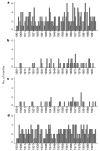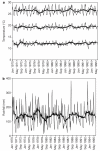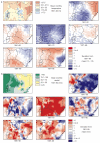Climate change and the resurgence of malaria in the East African highlands
- PMID: 11859368
- PMCID: PMC3164800
- DOI: 10.1038/415905a
Climate change and the resurgence of malaria in the East African highlands
Abstract
The public health and economic consequences of Plasmodium falciparum malaria are once again regarded as priorities for global development. There has been much speculation on whether anthropogenic climate change is exacerbating the malaria problem, especially in areas of high altitude where P. falciparum transmission is limited by low temperature. The International Panel on Climate Change has concluded that there is likely to be a net extension in the distribution of malaria and an increase in incidence within this range. We investigated long-term meteorological trends in four high-altitude sites in East Africa, where increases in malaria have been reported in the past two decades. Here we show that temperature, rainfall, vapour pressure and the number of months suitable for P. falciparum transmission have not changed significantly during the past century or during the period of reported malaria resurgence. A high degree of temporal and spatial variation in the climate of East Africa suggests further that claimed associations between local malaria resurgences and regional changes in climate are overly simplistic.
Figures



Comment in
-
Climate change: Regional warming and malaria resurgence.Nature. 2002 Dec 12;420(6916):627-8; discussion 628. doi: 10.1038/420627a. Nature. 2002. PMID: 12478282 No abstract available.
Similar articles
-
Hot topic or hot air? Climate change and malaria resurgence in East African highlands.Trends Parasitol. 2002 Dec;18(12):530-4. doi: 10.1016/s1471-4922(02)02374-7. Trends Parasitol. 2002. PMID: 12482536 Free PMC article.
-
Association between climate variability and malaria epidemics in the East African highlands.Proc Natl Acad Sci U S A. 2004 Feb 24;101(8):2375-80. doi: 10.1073/pnas.0308714100. Proc Natl Acad Sci U S A. 2004. PMID: 14983017 Free PMC article.
-
Malaria resurgence in the East African highlands: temperature trends revisited.Proc Natl Acad Sci U S A. 2006 Apr 11;103(15):5829-34. doi: 10.1073/pnas.0508929103. Epub 2006 Mar 29. Proc Natl Acad Sci U S A. 2006. PMID: 16571662 Free PMC article.
-
Climate variability and malaria epidemics in the highlands of East Africa.Trends Parasitol. 2005 Feb;21(2):54-6. doi: 10.1016/j.pt.2004.11.002. Trends Parasitol. 2005. PMID: 15664525 Review.
-
Malaria in the African highlands: past, present and future.Bull World Health Organ. 1998;76(1):33-45. Bull World Health Organ. 1998. PMID: 9615495 Free PMC article. Review.
Cited by
-
Age, gender, and infectious status-wise assessments of hematological parameters among patients with dengue infection.Heliyon. 2024 Jul 4;10(13):e34053. doi: 10.1016/j.heliyon.2024.e34053. eCollection 2024 Jul 15. Heliyon. 2024. PMID: 39055808 Free PMC article.
-
Adapting to the shifting landscape: Implications of climate change for malaria control: A review.Medicine (Baltimore). 2024 Jul 19;103(29):e39010. doi: 10.1097/MD.0000000000039010. Medicine (Baltimore). 2024. PMID: 39029063 Free PMC article. Review.
-
Bionomics of Anopheles culicifacies Sensu Lato in two Malaria Endemic Districts of Central Gujarat, India.J Arthropod Borne Dis. 2022 Jun 30;16(2):108-123. doi: 10.18502/jad.v16i2.11802. eCollection 2022 Jun. J Arthropod Borne Dis. 2022. PMID: 37038509 Free PMC article.
-
The relative effect of climate variability on malaria incidence after scale-up of interventions in western Kenya: A time-series analysis of monthly incidence data from 2008 to 2019.Parasite Epidemiol Control. 2023 Mar 15;21:e00297. doi: 10.1016/j.parepi.2023.e00297. eCollection 2023 May. Parasite Epidemiol Control. 2023. PMID: 37021322 Free PMC article.
-
Rapid range shifts in African Anopheles mosquitoes over the last century.Biol Lett. 2023 Feb;19(2):20220365. doi: 10.1098/rsbl.2022.0365. Epub 2023 Feb 15. Biol Lett. 2023. PMID: 36789530 Free PMC article.
References
-
- Loevinsohn ME. Climatic warming and increased malaria incidence in Rwanda. Lancet. 1994;343:714–718. - PubMed
-
- McMichael AJ, Haines A, Sloof R, Kovats S. Climate Change and Human Health. World Health Organization; Geneva: 1996.
-
- Epstein PR, et al. Biological and physical signs of climate change: focus on mosquito-borne diseases. Bull. Am. Meteorol. Soc. 1998;79:409–417.
-
- Martens P. How will climate change affect human health? Am. Sci. 1999;87:534–541.
-
- McCarthy JJ, Canziani OF, Leary NA, Dokken DJ, White KS. Climate change 2001: Impacts, Adaptation, and Vulnerability—Contribution of Working Group II to the Third Assessment Report of the Intergovernmental Panel on Climate Change. Cambridge Univ. Press; Cambridge: 2001.
Publication types
MeSH terms
Grants and funding
LinkOut - more resources
Full Text Sources
Miscellaneous

